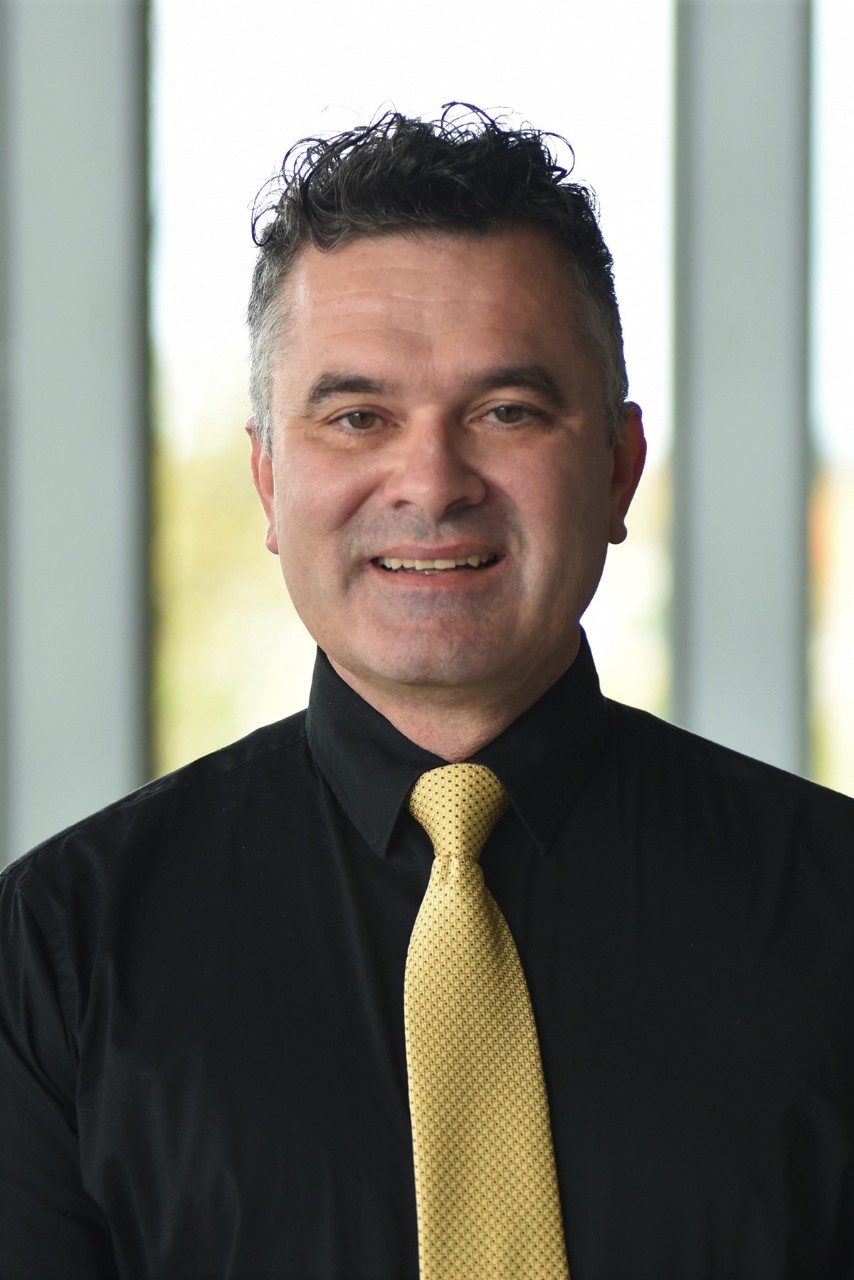
When Northern Kentucky University launched its entry-level doctor of occupational therapy (OT) program in early 2022, Dr. Terrance Anderson played a major role in shaping its curriculum and student-centered focus. Hired by NKU in 2018 as the program’s inaugural director, Anderson brought two decades of experience in academia to the role. In 1997, he was one of the first faculty brought on to the University of Mary’s newly-opened occupational therapy program—a position he held for nearly 15 years before he was recruited to open a similar program at Kettering College. His leadership produced remarkable results: Kettering’s first OT program saw 100% retention, 100% compliance and a 100% pass rate.
In 2018, retired NKU nursing faculty member Sandy Grinnell, a friend of Anderson’s family, recommended that he visit campus and consider inaugurating a new occupational therapy program. The experience was eye-opening and ultimately convinced Anderson to come aboard.
“I saw the beautiful buildings and wonderful facilities, and I also got to interact with some of the people on campus,” he says. “It was a very welcoming environment—definitely the type of environment I’d like to work in.”
After three years of preparation, NKU’s program commenced, addressing a strong need for more occupational therapists in the regional market. According to Anderson, the field is one of the United States’ fastest-growing careers, with even greater demand projected for the near future.
“They really mesh with the mission and values of the university. They’re very much embracing a student-centered approach to their work and focusing on inclusion."
“This program prepares the students to take the national registry exam to become an occupational therapist in all 50 states, and probably internationally with a few extra hoops to jump through,” he says. “As practitioners, we work everywhere from public school systems to daycare centers to hospitals and rehab centers, to work in industry or academia. We have a very broad scope and range of settings.”
Over the program’s first year of activity, Anderson has been impressed by the quality of faculty and students that NKU has been able to bring into the fold.
“They really mesh with the mission and values of the university. They’re very much embracing a student-centered approach to their work and focusing on inclusion,” he says. “There’s a lot of respectful interaction, consideration and looking to understand what's going on. We've also had lots of challenges. Opening a new program takes a lot of resources, a lot of work, so everyone's been working very hard, and people have been very flexible.”
He also cites the College of Health and Human Services’ Simulation Center as one of his program’s most cutting-edge offerings. While many occupational therapy programs conduct their Level 1 fieldwork in a professional, off-site setting, NKU is part of a growing movement within the industry toward simulation-based, faculty-led clinicals.
Accredited by the Society for Simulation in Healthcare, NKU’s Simulation Center allows students to practice realistic health care scenarios in eight inpatient simulation rooms, a home health environment and eight outpatient examination rooms. Students interact with high-definition mannequins and professional actors to bridge knowledge attained in the classroom with hands-on skills.
“I remember when I was a student doing one of my level one fieldworks, and one of my patients coded,” Anderson says. “I was like, ‘My patient is having trouble breathing. I’ve only read about this, but I’ve never seen it.’ It was stressful. I had to ask someone whether it was a valid code situation. The patient ended up being fine, but I like that our students will have the opportunity to see the difference between a patient falling asleep and a patient coding through a high fidelity mannequin simulation before entering the clinic with patients.”
Another unique component of NKU’s occupational therapy program is its flexibility during summer. Because many graduate students balance their coursework with jobs, all OT summer classes are scheduled to meet once a week on the same day, in a hybrid format, to allow students greater flexibility for schedule summer work.
“We’re really looking to attract first-generation students and those who need to support themselves as they're going through school,” Anderson says.
Anderson’s own journey toward a career in occupational therapy was not a straightforward path.
“I was one of those who changed my majors many, many times,” he says. “I took some breaks during college because I still hadn't found the exact niche that I was looking for. I was interested in teaching, I was interested in helping people, I was interested in computer sciences, and I love math. I had all these great interests but never really found my niche.”
Shortly after earning his undergraduate degree, Anderson was injured in a serious car accident, and underwent physical therapy to recover. The experience inspired an interest in physical therapy as a potential career path, and while exploring graduate programs, he came across a few universities offering degrees in occupational therapy: the practice of using everyday activities to treat injuries and illnesses.
“I’d never heard of the field before, but when I read the definition and learned more about what occupational therapists do, I realized it was a natural fit for me,” he says. “The concept of every intervention session is designed uniquely for the patient. I can remember as a kid, my dad, who grew up on a farm, never understood why people would go to the gym to work out. He’d always say that it's much more rewarding to go out and cut a pile of firewood: You get your physical exercise, and then you can see the output of your work. When you’re doing something productive and meaningful, it’s much easier to do—and more rewarding.”
Applications are currently being accepted for the occupational therapy cohort beginning January 2024. Applications are processed in the order received (first- come, first- serve basis) with admission offers made within a month of submitting applications. Learn more about NKU’s entry-level doctor of occupational therapy program and its faculty on the NKU Occupational Therapy website.